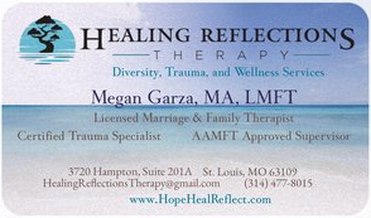About Me
I am a licensed Marriage and Family Therapist in Missouri & Illinois, certified Trauma Care specialist and EMDR Therapist, past President of the St. Louis Association of Marriage and Family Therapy, and Advisory Board Member of the National Partnership for Ending Interpersonal Violence Across the Lifespan (NPEIV). I come to you with over Twenty years of experience as a therapist working with diverse populations across the lifespan.
I began my training in group homes with the disabled, which evolved into working as a behavioral therapist for autistic children in home and school-based settings. I later worked as a play therapist in a school setting in Los Angeles. I have additional experience working as a victim advocate in a court house in Indiana, performing neuropsychiatric and intelligence assessments with individuals with traumatic brain injury in a hospital setting; as well as individual counseling with children, teens, and adults in community counseling centers.
I worked for 12.5 years at the YWCA Metro St. Louis/Women's Resource Center/St. Louis Regional Sexual Assault Center providing individual and group trauma related counseling to adult and adolescent sexual abuse and domestic violence survivors and their families. I have also worked for 12 years at Behavioral Health Response as a Mobile Outreach Crisis Counselor performing on-site (in their homes, jails, school, hospitals, treatments centers, etc) crisis assessments with individuals who are suicidal, homicidal, psychotic, depressed, anxious, or in crisis , and give them referrals for treatment or aid in safety planning or hospitalization. I always appreciate referrals from my fellow colleagues and community members.
I specialize in treating trauma, with particular emphasis on sexual trauma and mostly complex trauma cases. Many of my clients come from racially diverse and bicultural backgrounds. I am trained in Evidence-Based treatment modalities like Cognitive Processing Therapy (CPT), Prolonged Exposure (PE), Trauma-Focused Cognitive Behavioral Therapy (TF-CBT), Eye Movement Desensitization Reprocessing (EMDR), Structured Psychotherapy for Adolescents Responding to Chronic Stress (SPARCS), Integrative Treatment for Complex Trauma (ITCT), and Parent-Child Interaction Therapy (PCIT) . I am EMDR certified by EMDRIA. I have spoken at national and statewide conferences on the topics of Trauma-Informed Care, sexual violence, boundary setting, crisis de-escalation, sexual abuse and disabilities, and PTSD. I have published and edited peer reviewed research in the area of Trauma-informed care, sexual abuse, risky sexual behavior, and eating disorders.
I work mainly with individuals, but my degree as a marriage and family therapist gives me special expertise in working with couples and families as well using a trauma-informed lens. I value cultural competency and a significant portion of clients I serve are from diverse backgrounds and are navigating life with parents/family who hold different cultural values as their own. I offer late evening appointment availability that is ideal for parents or working professionals.
In my spare time I enjoy traveling, photography, antique furniture reupholstery, reading, thrift store shopping, metalsmithing, watching movies, rockhounding, genealogy, crafting, spending time with family and friends, volunteering with the Humane Society and Big Brothers Big Sisters, and watching funny cat videos on social media.
In addition to providing individual, group, couple, and family therapy to adults, children, and adolescents, I am also available to provide clinical supervision for licensure candidates as an AAMFT Approved Supervisor. As a Certified Trauma Care Supervisor I can provide consultations to those seeking better understanding with traumatized populations. Potential supervisees should check with their licensure board to see if an MFT supervisor is acceptable for their training. If you are interested in receiving Clinical Supervision, check out my Clinical Supervision Page. If you want information about trauma resources, see the trauma resources page, check out my blog entries, or look into the resources provided below.
I began my training in group homes with the disabled, which evolved into working as a behavioral therapist for autistic children in home and school-based settings. I later worked as a play therapist in a school setting in Los Angeles. I have additional experience working as a victim advocate in a court house in Indiana, performing neuropsychiatric and intelligence assessments with individuals with traumatic brain injury in a hospital setting; as well as individual counseling with children, teens, and adults in community counseling centers.
I worked for 12.5 years at the YWCA Metro St. Louis/Women's Resource Center/St. Louis Regional Sexual Assault Center providing individual and group trauma related counseling to adult and adolescent sexual abuse and domestic violence survivors and their families. I have also worked for 12 years at Behavioral Health Response as a Mobile Outreach Crisis Counselor performing on-site (in their homes, jails, school, hospitals, treatments centers, etc) crisis assessments with individuals who are suicidal, homicidal, psychotic, depressed, anxious, or in crisis , and give them referrals for treatment or aid in safety planning or hospitalization. I always appreciate referrals from my fellow colleagues and community members.
I specialize in treating trauma, with particular emphasis on sexual trauma and mostly complex trauma cases. Many of my clients come from racially diverse and bicultural backgrounds. I am trained in Evidence-Based treatment modalities like Cognitive Processing Therapy (CPT), Prolonged Exposure (PE), Trauma-Focused Cognitive Behavioral Therapy (TF-CBT), Eye Movement Desensitization Reprocessing (EMDR), Structured Psychotherapy for Adolescents Responding to Chronic Stress (SPARCS), Integrative Treatment for Complex Trauma (ITCT), and Parent-Child Interaction Therapy (PCIT) . I am EMDR certified by EMDRIA. I have spoken at national and statewide conferences on the topics of Trauma-Informed Care, sexual violence, boundary setting, crisis de-escalation, sexual abuse and disabilities, and PTSD. I have published and edited peer reviewed research in the area of Trauma-informed care, sexual abuse, risky sexual behavior, and eating disorders.
I work mainly with individuals, but my degree as a marriage and family therapist gives me special expertise in working with couples and families as well using a trauma-informed lens. I value cultural competency and a significant portion of clients I serve are from diverse backgrounds and are navigating life with parents/family who hold different cultural values as their own. I offer late evening appointment availability that is ideal for parents or working professionals.
In my spare time I enjoy traveling, photography, antique furniture reupholstery, reading, thrift store shopping, metalsmithing, watching movies, rockhounding, genealogy, crafting, spending time with family and friends, volunteering with the Humane Society and Big Brothers Big Sisters, and watching funny cat videos on social media.
In addition to providing individual, group, couple, and family therapy to adults, children, and adolescents, I am also available to provide clinical supervision for licensure candidates as an AAMFT Approved Supervisor. As a Certified Trauma Care Supervisor I can provide consultations to those seeking better understanding with traumatized populations. Potential supervisees should check with their licensure board to see if an MFT supervisor is acceptable for their training. If you are interested in receiving Clinical Supervision, check out my Clinical Supervision Page. If you want information about trauma resources, see the trauma resources page, check out my blog entries, or look into the resources provided below.
"Our lives begin to end the day we become silent about things that matter."
Martin Luther King Jr
Megan's Treatment Philosophy
Because of my diverse training and background experiences, I have adapted an integrative approach to treatment. My work is strongly influenced by Humanist psychology theorists/practitioners like Carl Rogers, who place special emphasis on treating clients with genuineness, empathy, and positive regard. I see us all as human beings, both beautiful and flawed, worthy of equal respect, rights, and dignity and focus on treating my clients with warmth and compassion. I also try to incorporate humor and irreverence into the treatment process. I am not a fan of using therapy jargon or using techniques that people find hokey like what they commonly show on t.v. or movies and prefer to be real with my clients.
I tend to value evidenced-based therapies like Cognitive-Behavioral Therapy (CBT), which means I try to help clients look for patterns in the ways they are thinking or acting that may be causing problems for them and help them establish healthier ways of living. I balance CBT techniques with a collaborative, client-centered approach to therapy, focusing on the needs and goals of the client, and adjusting treatment to best meet with the goals that they established for themselves. Of course, I also use a Family Systems perspective and an intersectional feminist lens when conceptualizing client's unique situations, as I recognize the role of family and culture (both micro and macro level), even from generations ago, often has a strong influence on who we are today.
One thing I tend to be known for with my clients is that whatever issue they come to therapy to address, I will work with them to gently, but firmly push them to help them resolve it. I have heard of many clients that see therapists for years, but never actually addressed the issues that they originally came into therapy for. I recognize there may be many reasons for this, but I believe I would be doing my clients a great disservice if I did not work with them to address their primary underlying concern. What does this mean for therapy with me? It means that you can expect to do hard work and may be challenged to do uncomfortable work at times, but it is often the work that it takes to help reach your goals. Since I encourage my clients to do hard work, I emphasize praise and rewards for their achievements, relying on client's strengths as motivators for change.
I tend to value evidenced-based therapies like Cognitive-Behavioral Therapy (CBT), which means I try to help clients look for patterns in the ways they are thinking or acting that may be causing problems for them and help them establish healthier ways of living. I balance CBT techniques with a collaborative, client-centered approach to therapy, focusing on the needs and goals of the client, and adjusting treatment to best meet with the goals that they established for themselves. Of course, I also use a Family Systems perspective and an intersectional feminist lens when conceptualizing client's unique situations, as I recognize the role of family and culture (both micro and macro level), even from generations ago, often has a strong influence on who we are today.
One thing I tend to be known for with my clients is that whatever issue they come to therapy to address, I will work with them to gently, but firmly push them to help them resolve it. I have heard of many clients that see therapists for years, but never actually addressed the issues that they originally came into therapy for. I recognize there may be many reasons for this, but I believe I would be doing my clients a great disservice if I did not work with them to address their primary underlying concern. What does this mean for therapy with me? It means that you can expect to do hard work and may be challenged to do uncomfortable work at times, but it is often the work that it takes to help reach your goals. Since I encourage my clients to do hard work, I emphasize praise and rewards for their achievements, relying on client's strengths as motivators for change.
"We must become the change we want to see"
Mahatma Gandhi
Specialty Areas
- Trauma and Posttraumatic Stress Disorder
- Complex (sometimes known as CPTSD) and Simple Trauma
- Sexual Trauma: Sexual Violence, Sexual Abuse, Sexual Assault, Rape, Sexual Harassment
- Female Empowerment
- Women's Issues
- Crisis Counseling
- Child & Adolescent Counseling (limited to ages 16 and up currently)
- Couple/Relationship & Family Therapy
- Grief/loss
- Depression
- Anxiety
- Bicultural experiences/Diverse cultural experiences
Licenses and Certifications
Licensed Marriage and Family Therapist Missouri #2011011850
Illinois #166001465
Certified Trauma Care Supervisor Specialist, Issued by the Institute of Violence, Abuse, and Trauma at Alliant University 2013
American Association of Marriage and Family Therapists (AAMFT) Approved Supervisor, designation awarded 2016
EMDR Certified Therapist, EMDRIA International Association, 2021
Prepare/Enrich Premarital /Relational Counseling, 2024
Illinois #166001465
Certified Trauma Care Supervisor Specialist, Issued by the Institute of Violence, Abuse, and Trauma at Alliant University 2013
American Association of Marriage and Family Therapists (AAMFT) Approved Supervisor, designation awarded 2016
EMDR Certified Therapist, EMDRIA International Association, 2021
Prepare/Enrich Premarital /Relational Counseling, 2024
Education
University of Missouri-St. Louis 2006 Master of Arts Degree Psychology
2004-08 Advanced Coursework Clinical Psychology (non-degree)
Pepperdine University 2003 Master of Arts Degree Clinical Psychology with an Emphasis in Marriage and Family Therapy
Valparaiso University 2001 Bachelor of Science Degree Psychology & Sociology
2004-08 Advanced Coursework Clinical Psychology (non-degree)
Pepperdine University 2003 Master of Arts Degree Clinical Psychology with an Emphasis in Marriage and Family Therapy
Valparaiso University 2001 Bachelor of Science Degree Psychology & Sociology
Professional Experience
- Healing Reflections Therapy: Co-Owner, Therapist St. Louis, MO
- Care and Counseling, Resident Supervisor St. Louis, MO
- YWCA Metro St. Louis (Women's Resource Center: St. Louis Regional Sexual Assault Center), Lead Therapist St. Louis, MO
- Behavioral Health Response, Mobile Outreach Crisis Counselor St. Louis, MO
- Burning Man Project, Crisis Intervention Team/Survivor Advocacy Team Staff Black Rock City, NV
- Children's Advocacy Services, Therapist Intern St. Louis, MO
- Community Psychological Service, Therapist/Psychological Trainee St. Louis, MO
- St. Clare Hospital, Neuropsych testing Psychological Assessment Administrator Alton, IL
- University of Missouri-St. Louis, Teaching Assistant St. Louis, MO
- Hollywood YMCA Counseling Center, Therapist Intern Hollywood, CA
- Wisconsin Early Autism Project, Behavioral Therapist Valparaiso, IN
- Porter Country Prosecutor's Office, Victim Advocate Intern Valparaiso, IN
- Northwest Indiana Special Education Cooperative, Behavioral Therapist Intern Valparaiso, IN
- Hope Network, Support Worker Grand Rapids, MI
Public Speaking
- St. Louis Association for Marriage and Family Therapy November, 2023
- Presented 2 hour workshop on "So You Are Thinking About Starting a Private Practice" training for mental health professionals with Chris Scarberry, MA, LPC
- International Summit on Violence, Abuse, and Trauma San Diego, CA August, 2022
- Invited Speaker/ Co-Presented on a Keynote Panel August, 2022 on "Trauma-Informed Care for Victims of Trauma" along with Researcher Karen Rich, PhD
- Webinar speaker with the National Partnership for Ending Interpersonal Violence & Pennsylvania grant June, 2022
- "Addressing the Impact of Violence: Concrete Action Steps for Addressing Interpersonal Violence in Pennsylvania" with Pearl Berman, Joyce Thomas, Karen Rich, and Susan Omilian.
- https://www.youtube.com/watch?v=bafhxI6PIlc&t=6s
- International Summit on Violence, Abuse, and Trauma San Diego, CA September, 2021
- Invited Speaker/ Co-Presented on a Panel April 2021 on "Trauma-Informed Responses to the Trauma of the Covid Pandemic with a Focus on Interpersonal Violence Survivors" along with Rachel Ramirez, MSW, Researcher Karen Rich, PhD, and Therapist Diana Barnes-Fox, LMFT
- Hawaii Summit on Violence, Abuse, and Trauma Honolulu, Hawaii
- Invited Speaker/ Co-Presented on a Panel April 2021 on "Trauma-Informed Responses to the Trauma of the Covid Pandemic with a Focus on Interpersonal Violence Survivors" along with Rachel Ramirez, MSW, Researcher Karen Rich, PhD, and Therapist Diana Barnes-Fox, LMFT
- San Diego Schools, Virtual Guest Speaker on Making Trauma-Informed Care work for your School Community, March. 2021
- Maryville University, Guest lecturer on Trauma and Racism, November 2020
- International Summit on Violence, Abuse, and Trauma San Diego, CA September, 2020
- Invited Speaker/ Co-Presented September 2019 on "Bringing Trauma Informed Care into Your Community, Your Practice, Your Life" along with Author Susan Omilian, JD, Researcher Karen Rich, PhD, and Therapist Diana Barnes-Fox, LMFT
- SCRIPTS Survivor Conference, Virtual Co-Presenter, September 2020, “Bringing Trauma-Informed Care to your Community, Your Practice, Your Life” along with Dr. Karen Rich, Ph.D.
- Psychotherapy St. Louis Virtual Guest Speaker, June 2020, “What Sexual Trauma Survivors Wish You Knew.”
- St. Louis Association for Marriage and Family Therapy, Guest Speaker, June 2020, "Responding to Suicidality After Trauma"
- International Summit on Violence, Abuse, and Trauma San Diego, CA
- Invited Keynote Panel Speaker September 2019 with Dr. Vincent Felitti of the ACES study, Community Advocate Joyce Pearlman, and Moderator Dr. Karen Rich on "How to Implement Trauma Informed Care Into Systems of Care: Overcoming Systemic Barriers"
- Invited Speaker September 2019 on "Supporting Survivors in the Age of MeToo"
- Invited Speaker/ Co-Presented September 2019 on "Bringing Trauma Informed Care into Your Community, Your Practice, Your Life" along with Author Susan Omilian, JD, Researcher Karen Rich, PhD, and Therapist Diana Barnes-Fox, LMFT
- Hawaii Summit on Violence, Abuse, and Trauma Honolulu, Hawaii
- Invited Speaker/Co-presenter April 2019 on "Making Trauma Informed Care Work for Your Community"
- Missouri Coalition Against Domestic and Sexual Violence Annual Conference Columbia, MO
- Conference Co-Presenter, October 2018 on “Making Trauma Informed Care Work for Your Community”
- Institute of Violence, Abuse, and Trauma (IVAT) International Summit San Diego, CA
- Invited Co-Presenter, September 2018 on “Making Trauma Informed Care Work for Your Community”
- Behavioral Health Response (BHR), St. Louis, MO
- Trainer, July 2018 on "Making Trauma Informed Care Work for Your Community"
- Hawaii Summit on Violence, Abuse, and Trauma Honolulu, Hawaii
- Invited Speaker/Co-presenter April 2018 on "Making Trauma Informed Care Work for Your Community"
- Washington University, Uncle Joe's St. Louis, MO
- Speaker, April 2018 on "What Sexual Trauma Survivors Wish You Knew"
- YWCA Metro St. Louis
- Presenter, February 2018, "What is Trauma Informed Care"
- AboutSex Podcast
- Podcast Interview, February 2018, Sexual Trauma Counseling and #MeToo
- Institute of Violence, Abuse, and Trauma (IVAT) International Summit San Diego, CA
- Invited Presenter, August 2017 on “Enhancing the Response to Drug Facilitates Sexual Assault”
- Panel Speaker on "Trauma Informed Care"
- Missouri Coalition Against Domestic and Sexual Violence Annual Conference Columbia, MO
- Conference Presenter, October 2016 on “Overcoming the Trauma of Secrecy after Sexual Victimization”
- Institute of Violence, Abuse, and Trauma (IVAT) International Summit San Diego, CA
- Invited Presenter, August 2016 on “Overcoming the Trauma of Secrecy after Sexual Victimization”
- Panel Moderator on "Trauma Informed Care"
- Missouri Coalition Against Domestic and Sexual Violence Annual Conference Columbia, MO
- Conference Presenter, October 2015 on “What Sexual Trauma Survivors Wish You Knew”
- YWCA St. Louis Regional Sexual Assault Center
- Panel Speaker, October 2015 on “Sexual Violence” for YWCA’s Week without Violence
- Institute of Violence, Abuse, and Trauma (IVAT) International Summit San Diego, CA
- Presenter, August 2015 on “Empowerment with Sexual Trauma Survivors: Challenging Guilt and Self-Blame”
- Co-Presenter, August 2015 on “Invisible Victims: Prevention and Treatment of Sexual Abuse in the Disability Community”
- St. Louis Association of Marriage and Family Therapists (SLAMFT)
- Presenter, May 2015 on “Treating Trauma in the Family System”
- YWCA St. Louis Regional Sexual Assault Center
- Presenter, June & October, 2013, October 2014, March 2015 on “Posttraumatic Stress Disorder”
- YWCA St. Louis Regional Sexual Assault Center
- Co-Presenter, October 2014 on “Healing from Sexual Trauma: Psychoeducation and Empowerment Tools.”
- Missouri Association of Marriage and Family Therapy Annual Conference: Trauma Informed Care
- Presenter, April 2014 on “What Sexual Trauma Survivors wish you knew”
- YWCA St. Louis Regional Sexual Assault Center
- Co-Presenter, June, August, & November 2013 on “Crisis De-Escalation”
- Missouri Coalition Against Domestic and Sexual Violence Annual Conference Columbia, MO
- Conference Co-Presenter, 2011 on “Crossing the Line: Boundary Setting in Therapy”
- Missouri Coalition Against Domestic and Sexual Violence Annual Conference Columbia, MO
- Conference Presenter, 2010 on “Healing from Sexual Trauma: Psychoeducation and Empowerment Tools”
- University of Missouri – St. Louis
- Teaching Assistant, 2004 - 2006
- Hollywood YMCA Counseling Center Hollywood, CA
- Workshop Presenter, 2004 on "Rape Treatment Strategies"
Publications
Rich K., Garza M.R. (2020) Trauma-Informed Systems of Care. In: Geffner R., White J.W., Hamberger L.K., Rosenbaum A., Vaughan-Eden V., Vieth V.I. (eds) Handbook of Interpersonal Violence and Abuse Across the Lifespan. Springer, Cham. https://doi.org/10.1007/978-3-319-62122-7_293-1
"Survivors of interpersonal trauma are vulnerable to risk of re-victimization when seeking help from community agencies such as welfare offices, substance abuse clinics, schools, homeless shelters, medical facilities and criminal justice agencies. Re-victimization of trauma survivors can lead to client dropout, “resistant” behavior, and treatment failure. It can also lead to stress, conflict, burnout, and frequent turnover among staff. Trauma-informed care is a community’s best approach to supporting survivors of interpersonal violence, but many agencies under-estimate its value or lack a comprehensive approach to its implementation. Budgetary concerns, resistance to change, turf issues, hierarchical power structures, lack of training, fears of trauma contagion and negative attitudes towards service recipients contribute to the problems. Interdisciplinary collaboration, investment in prevention, concern for employee wellness and top-down commitment are essential features of trauma-informed agencies. This chapter will present an overview of trauma-informed care, the benefits to clients and providers, obstacles to implementation of best practices, and research initiatives in the field."
Garza, M.R., Rich, K., Omilian, S.M. (2019). Guest Editor, Special Issue on Trauma-Informed Care, Journal of Aggression, Maltreatment and Trauma, Volume 28, Issues 4-5.
Garza, M.R., Rich, K., Omilian, S. M. (2019). A Trauma-Informed Call to Action: Culturally-Informed, Multi-disciplinary Theoretical and Applied Approaches to Prevention and Healing. Journal of Aggression, Maltreatment, and Trauma, 28, 4.
"Prevalence of trauma and its negative impact on humankind has created a burgeoning awareness of the need for systems that are trauma-informed across the lifespan. A collaborative project with the National Partnership to End Interpersonal Violence (NPEIV) sought out research as a call-to-action to mitigate the impact of trauma. The following is an introduction to a special double-issue focused on theoretical and applied approaches to using trauma-informed care in multi-disciplinary, mental and physical health, criminal justice, school-based, and community settings. Consideration is given to essential issues such as resilience, self-care, and cultural awareness."
Garza, M.R., Rich, K., Omilian, S. M. (2019). A Trauma-Informed Call to Action: Culturally-Informed, Multi-disciplinary Theoretical and Applied Approaches to Prevention and Healing, Part II. Journal of Aggression, Maltreatment, and Trauma, 28, 5.
"Prevalence of trauma and its negative impact on humankind has created a burgeoning awareness of the need for systems that are trauma-informed across the lifespan. A collaborative project with the National Partnership to End Interpersonal Violence (NPEIV) sought out research as a call-to-action to mitigate the impact of trauma. The following is an introduction to a special double-issue focused on theoretical and applied approaches to using trauma-informed care in multi-disciplinary, mental and physical health, criminal justice, school-based, and community settings. Consideration is given to essential issues such as resilience, self-care, and cultural awareness."
Conley, T., & Garza, M.R., (2011). Gender and Sequelae of Child vs. Adult Onset of Sexual Victimization: Body Mass, Binge Eating, and Promiscuity. Journal of Applied Social Psychology, 41, 11, 2251-2572. This research investigated the behavioral effects of age of sexual victimization onset by examining responses of those first victimized in childhood (age 15 and younger) and those first victimized in adulthood (age 18 and older). A third group of non-sexually victimized individuals served as a comparison group. Analysis of covariance revealed a significant relationship between Body Mass Index scores and age of victimization onset, with those victimized in childhood having a significantly higher body mass and weight than non-victims or those victimized in adulthood. These results are discussed from a developmental perspective in relation to psychological and physical health.
Garza, M. (2015). Dating Violence Vulnerabilities Among the Disabled. NPEIV March Newsletter.
http://media.wix.com/ugd/e2ef87_1cd1fd8e9a_3e4161b8a68df14c256044.pdf
"Survivors of interpersonal trauma are vulnerable to risk of re-victimization when seeking help from community agencies such as welfare offices, substance abuse clinics, schools, homeless shelters, medical facilities and criminal justice agencies. Re-victimization of trauma survivors can lead to client dropout, “resistant” behavior, and treatment failure. It can also lead to stress, conflict, burnout, and frequent turnover among staff. Trauma-informed care is a community’s best approach to supporting survivors of interpersonal violence, but many agencies under-estimate its value or lack a comprehensive approach to its implementation. Budgetary concerns, resistance to change, turf issues, hierarchical power structures, lack of training, fears of trauma contagion and negative attitudes towards service recipients contribute to the problems. Interdisciplinary collaboration, investment in prevention, concern for employee wellness and top-down commitment are essential features of trauma-informed agencies. This chapter will present an overview of trauma-informed care, the benefits to clients and providers, obstacles to implementation of best practices, and research initiatives in the field."
Garza, M.R., Rich, K., Omilian, S.M. (2019). Guest Editor, Special Issue on Trauma-Informed Care, Journal of Aggression, Maltreatment and Trauma, Volume 28, Issues 4-5.
Garza, M.R., Rich, K., Omilian, S. M. (2019). A Trauma-Informed Call to Action: Culturally-Informed, Multi-disciplinary Theoretical and Applied Approaches to Prevention and Healing. Journal of Aggression, Maltreatment, and Trauma, 28, 4.
"Prevalence of trauma and its negative impact on humankind has created a burgeoning awareness of the need for systems that are trauma-informed across the lifespan. A collaborative project with the National Partnership to End Interpersonal Violence (NPEIV) sought out research as a call-to-action to mitigate the impact of trauma. The following is an introduction to a special double-issue focused on theoretical and applied approaches to using trauma-informed care in multi-disciplinary, mental and physical health, criminal justice, school-based, and community settings. Consideration is given to essential issues such as resilience, self-care, and cultural awareness."
Garza, M.R., Rich, K., Omilian, S. M. (2019). A Trauma-Informed Call to Action: Culturally-Informed, Multi-disciplinary Theoretical and Applied Approaches to Prevention and Healing, Part II. Journal of Aggression, Maltreatment, and Trauma, 28, 5.
"Prevalence of trauma and its negative impact on humankind has created a burgeoning awareness of the need for systems that are trauma-informed across the lifespan. A collaborative project with the National Partnership to End Interpersonal Violence (NPEIV) sought out research as a call-to-action to mitigate the impact of trauma. The following is an introduction to a special double-issue focused on theoretical and applied approaches to using trauma-informed care in multi-disciplinary, mental and physical health, criminal justice, school-based, and community settings. Consideration is given to essential issues such as resilience, self-care, and cultural awareness."
Conley, T., & Garza, M.R., (2011). Gender and Sequelae of Child vs. Adult Onset of Sexual Victimization: Body Mass, Binge Eating, and Promiscuity. Journal of Applied Social Psychology, 41, 11, 2251-2572. This research investigated the behavioral effects of age of sexual victimization onset by examining responses of those first victimized in childhood (age 15 and younger) and those first victimized in adulthood (age 18 and older). A third group of non-sexually victimized individuals served as a comparison group. Analysis of covariance revealed a significant relationship between Body Mass Index scores and age of victimization onset, with those victimized in childhood having a significantly higher body mass and weight than non-victims or those victimized in adulthood. These results are discussed from a developmental perspective in relation to psychological and physical health.
Garza, M. (2015). Dating Violence Vulnerabilities Among the Disabled. NPEIV March Newsletter.
http://media.wix.com/ugd/e2ef87_1cd1fd8e9a_3e4161b8a68df14c256044.pdf
Awards
- Big Sister of the Year- Big Brothers Big Sisters of Eastern Missouri, awarded 2019
- Big Sister of the Year, Big Brothers Big Sisters of Missouri, Awarded 2019
Professional Memberships
- St. Louis Association of Marriage and Family Therapy (SLAMFT), President 2018-2020; Member 2010-Present
- Check out our Group on facebook at SLAMFT St.Louis or visit our AAMFT Interest Network Page at https://networks.aamft.org/missourikansas/chapters/slamft
- American Association of Marriage and Family Therapists, Clinical Fellow
- EMDRIA- EMDR International Association Member
- American Association of Suicidology (AAS), Member
- National Partnership to End Interpersonal Violence (NPEIV), Board of Directors, Advisory Board 2018-Present, former Co-chair of Practice Committee, 2014-2018; Member 2013-Present www.NPEIV.org
- The National Partnership to End Interpersonal Violence Across the Lifespan (NPEIV) Practice Action Team #3 has been working together to make practice-related contributions and recommendations toward the development and implementation of a National Plan for Ending Interpersonal Violence Across the Lifespan. The Practice Action Team developed a Policy Statement on Trauma Informed Care which recommends that systems and sectors acknowledge the impact of current or past victimization on victims and their families so they can respond in a manner that is fully supportive, whole person-centered and avoids re-traumatization. This trauma-informed approach recognizes that how people perceive or react to trauma can be influenced by their culture (e.g., gender, age, ability, ethnicity, race, religion, sexual orientation, geographical location, socio-economic status, family group) or the historic, systemic or intergenerational transmission of trauma, as well as the intersectionality of these factors. They presented the information at a panel discussion at the Institute of Violence, Abuse, and Trauma’s International Summit in 2016, 2017, 2018, and 2019. The Team recently served as Guest editors for a Special Issue on Trauma Informed Care for the Journal of Aggression, Maltreatment and Trauma to help professionals, advocates, and frontline workers better understand how to improve our systems of care. In addition, the Team has written articles published in the NPEIV Newsletter on subjects related to trauma, disabilities, sexual abuse, and dating violence. They continue to work together to carry their voice and their mission into the community to promote best practices and establish a network of providers nationwide to help facilitate healing and recovery from trauma and abuse. They are currently working on developing a project for Trauma-Informed Care provider database.
Fees
Megan Garza's specialized counseling services are available at $110-200 per hour on a sliding scale, $300 for the intake assessment. Sessions are generally 60 minutes, and intake sessions are usually 90-120 minutes.
Insurance
I accept private pay. I am also now in-network with Anthem Blue Cross Blue Shield of MO, Aetna, and Healthlink, and I can help you utilize your out-of-network benefits with other panels. Contact me about requesting sliding scale options.








